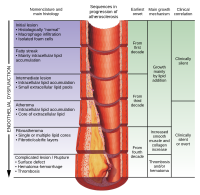
Photo from wikipedia
OBJECTIVES Peptide tyrosine tyrosine (PYY) exists as two species, PYY1-36 and PYY3-36 , with distinct effects on insulin secretion and appetite regulation. The detailed effects of bariatric surgery on PYY1-36… Click to show full abstract
OBJECTIVES Peptide tyrosine tyrosine (PYY) exists as two species, PYY1-36 and PYY3-36 , with distinct effects on insulin secretion and appetite regulation. The detailed effects of bariatric surgery on PYY1-36 and PYY3-36 secretion are not known as previous studies have used non-specific immunoassays to measure total PYY. Our objective was to characterise the effect of sleeve gastrectomy (SG) and Roux-en-Y gastric bypass (RYGB) on fasting and post-prandial PYY1-36 and PYY3-36 secretion using a newly developed liquid chromatography-tandem mass spectrometry (LC-MS/MS) assay. DESIGN AND SUBJECTS Observational study in 10 healthy non-obese volunteers and 30 participants with obesity who underwent RYGB (n=24) or SG (n=6) at the Imperial Weight Centre [NCT01945840]. Participants were studied using a standardised mixed meal test (MMT) before and 1 year after surgery. The outcome measure was PYY1-36 and PYY3-36 concentration. RESULTS Pre-surgery, the fasting and post-prandial levels of PYY1-36 and PYY3-36 were low, with minimal responses to the MMT, and these did not differ from healthy non-obese volunteers. The postprandial secretion of both PYY1-36 and PYY3-36 at 1 year was amplified after RYGB, but not SG, with the response being significantly higher in RYGB compared to SG. CONCLUSIONS There appears to be no difference in PYY secretion between non-obese and obese volunteers at baseline. At 1 year after surgery, RYGB, but not SG, is associated with increased post-prandial secretion of PYY1-36 and PYY3-36 , which may account for long-term differences in efficacy and adverse effects between the two types of surgery. This article is protected by copyright. All rights reserved.
Journal Title: Clinical endocrinology
Year Published: 2022
Link to full text (if available)
Share on Social Media: Sign Up to like & get
recommendations!